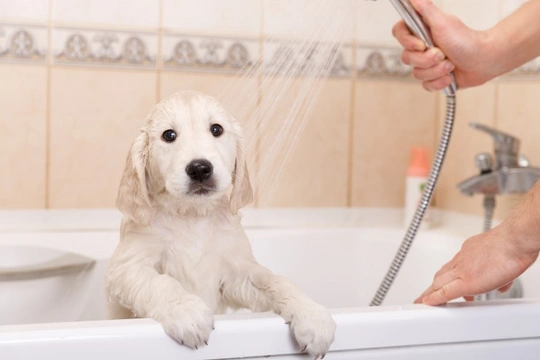
Allergy shampoos for dogs - Ingredients to avoid
If your dog suffers from allergies that affect their skin and coat, the most effective way of managing this and helping to prevent frequent or acute flare-ups is to minimise your dog’s exposure to whatever it is that sets them off, such as certain household cleaners, various ingredients in food, and a whole range of other things.
However, even with extensive testing and investigation, you may not always be able to find out exactly what is causing your dog’s allergies, which means that all you can do sometimes to make their lives easier is work to lessen their symptoms when they do flare up.
Even if you know exactly what it is that your dog is allergic to, it is not always possible to completely protect your dog from whatever is apt to trigger their allergies altogether, particularly if they are sensitive to environmental triggers like grass or pollen, which can make certain times of the year very uncomfortable for your dog in general.
Again, this means that you will need to work with the symptoms and particular presentation that your dog’s allergy takes, and do what you can then to keep them comfortable.
One of the most common ways to help to keep a dog with skin allergies comfortable, reduce the severity of inflammation and irritation and importantly, remove any remaining source of allergens, such as pollen, from the coat, is by bathing your dog with a special shampoo that is designed to soothe and nourish the skin, making your dog less itchy and uncomfortable as well as removing any lingering traces of the allergen itself.
Your vet will often recommend a specific shampoo to use to do this with, but there is no one size fits all solution for all dogs, and what proves to be effective for one might make no real difference to the comfort levels of another.
In this article, we will look at the ingredients of allergy shampoos in more detail, and look at the ingredients that can potentially help your dog, as well as those to avoid.
Read on to learn more!
What makes an allergy shampoo?
Allergy shampoos for dogs should perform three vital functions; clean the coat and skin, including removing any lingering traces of the allergenic compound, moisturise and nourish the skin, and help to support healthy skin recovery.
What allergy shampoos should not do, is dry the skin and coat, or strip the coat of its natural protective oils, particularly given that you may need to bathe a dog with allergies frequently, and what ingredients are present or absent within the product will dictate how well your shampoo will tick all of these boxes.
Why some ingredients are irritants
When it comes to allergy shampoos for dogs, what is left out of them is just as important as what goes into them! Allergy shampoos should contain the bare minimum of ingredients, which should be natural and carefully thought out, and not harsh or laden with chemicals and scents.
Many dogs that are susceptible to skin allergies and irritations will be sensitive to various chemicals, and this can pose a real challenge when bathing dogs prone to allergies like the English bulldog and the Dorset Old Tyme bulldogge.
Choosing organic shampoos can help with this, as can buying shampoos specifically designed for bathing dogs with allergies, which will keep unnecessary and potentially irritating ingredients out of their products.
Some common allergens in shampoos
The three core irritants to avoid when picking a shampoo for a dog with allergies are perfumes, preservatives and colorants, all of which are not only unnecessary added ingredients, but can also make allergies worse. However, all of these three things are commonly found in regular dog shampoos, and so learning to read the ingredient listings and shopping wisely is important.
There are also some natural ingredients that can be present in dog shampoos that, while they may be beneficial to the skin and coat of healthy dogs and some dogs with allergies, will irritate further a dog whose skin is already sore and who may be particularly sensitive.
Such ingredients include eucalyptus oil, anything citrus-related such as bergamot, citronella, and lemon or orange oils, and even tea tree oil, although for some dogs, tea tree oil may be beneficial.
Added to this, some products will work for some dogs and not others; for instance, aloe vera is an all-natural plant-based ingredient that has skin soothing and calming properties; however, if your dog is very sensitive to pollen and plant-based allergens, aloe vera might be a no-go for them as well.
Good ingredients for allergenic dogs
Finding the right pick of shampoo for your allergenic dog may take you some time; you may need to try out a variety of offerings to find one that suits them well. Some very plain, non-irritating shampoos can seem rather unusual in terms of their action and texture when using them, as they may not produce loads of bubbles or form a big lather, which is what we usually expect our shampoos to do. However, a big soapy lather is not what cleans your dog, it is the ingredients themselves that do the job, so don’t think that a shampoo is poor quality because it does not generate a lot of suds!
Oatmeal is one plain, neutral ingredient that is almost universally well tolerated by allergenic dogs, and plain oatmeal shampoos are usually a safe pick. Shampoos that include vitamin E, which is good for the skin, and biotin for moisture are generally good, safe choices as well.



